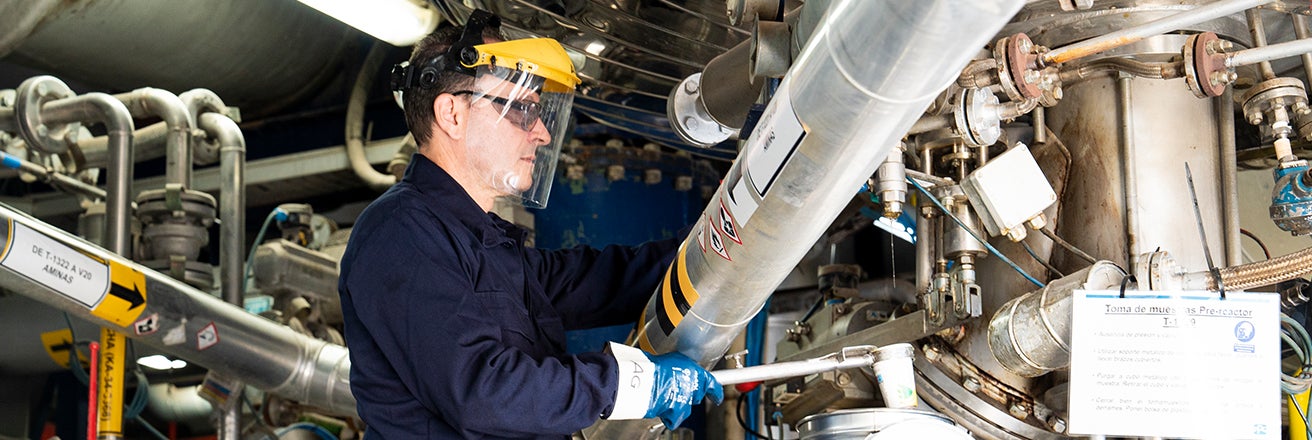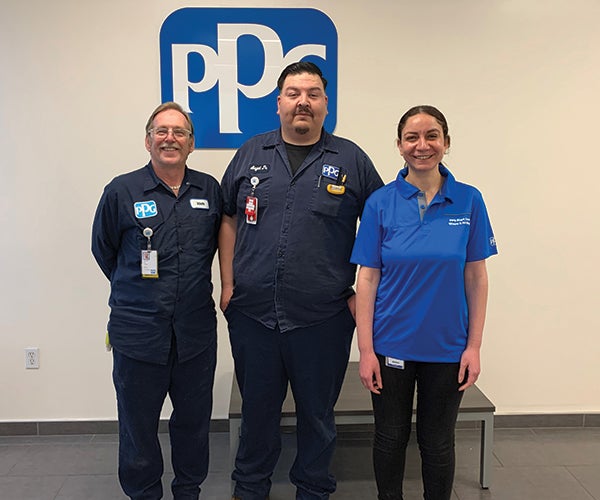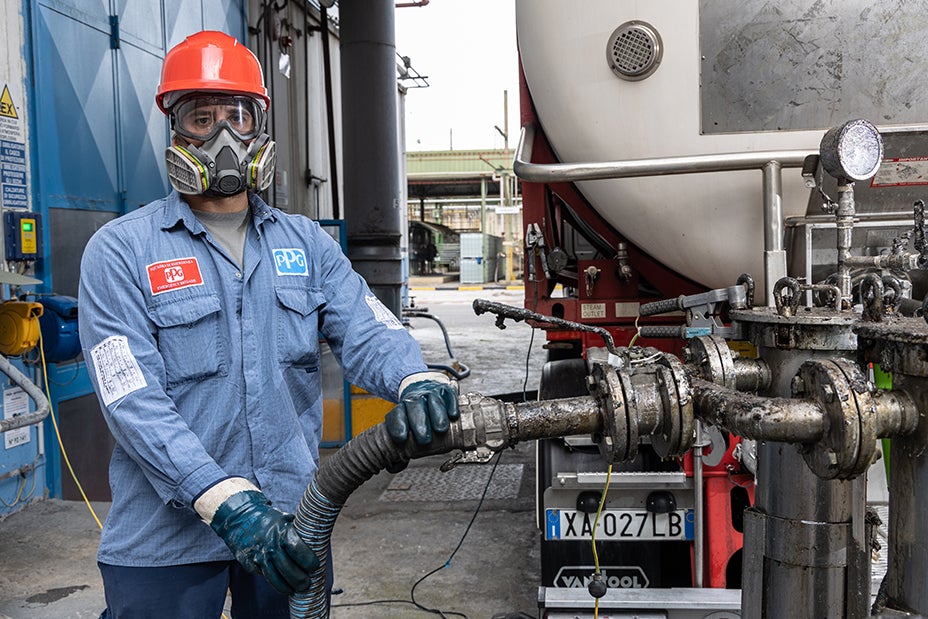Safety and Health

As a result of our continued focus on safety and health, we experienced no fatalities of PPG employees or PPG supervised contractors related to PPG operations in 2023. The overall PPG illness and injury (I&I) rate remained flat in 2023 compared to 2022. While the overall rate remained flat, we did achieve a decrease in the number and severity of the most significant injuries, due in large part to our focus on serious injuries and fatalities. We had 0.51 Tier I and 0.27 Tier II process safety incidents per one million hours worked. The highest I&I rates were recorded at recently acquired sites. As we implement our global, standardized EHS management system at these sites we expect injury and illness rates to decrease in line with the rest of our business.
Annual improvement in injury and illness rate


The 2023 PPG Ergo Cup
Each year since 2004, PPG has held an internal ERGO CUP. competition to share new inventions and innovations that minimize or eliminate ergonomic risks for our people. The winner of the 2023 Ergo Cup competition was the Aerospace Sylmar team, who developed a new grind and polish sandpaper changeout process for their facility. Their submission was selected as the winner from almost 200 entries for eliminating a substantial safety risk while delivering significant cost savings.
Prior to this project, the sandpaper changeout process required an operator to sit in a crouched position below a sanding wheel, pull off the existing sandpaper and scrape the leftover adhesive off the sanding wheel with a sharp-edged tool. To improve the safety of this ergonomically difficult task, the Sylmar team began using Velcro instead of adhesive to apply the sandpaper to the wheel. The time spent changing sandpaper using the Velcro was reduced from three hours to just five minutes, and is projected to save the Sylmar facility approximately 720 hours of machine downtime per year.
Incident review and reduction
The environment, health and safety (EHS) team conducts a detailed root-cause analysis for all process safety incidents. Around 47% of the 2023 incidents were primarily caused by human error, which we address through procedural and system changes. Around 28% of the incidents in 2023 resulted from malfunctioning equipment while around 19% were caused by improperly designed equipment. The team resolved these incidents by modifying inspection programs, reviewing equipment design, and repairing or replacing inadequate equipment. Our EHS team works to foster a learning culture where PPG employees are comfortable reporting elements of their job that may lead to injuries in the future. We prioritize systemic changes rather than emphasizing additional training because this approach protects everyone working in our facilities, rather than focusing on the individuals involved in an incident.
Over the course of 2023, we also worked to reduce our average response time for processing safety incidents and implementing mitigation measures. We track the percentage of follow up actions closed within 90 days. As a result of this focus, we saw significant improvement in the rate of corrective actions that we closed quickly. 93% of follow up actions were closed within 90 days in 2023.
Focus on avoiding serious incidents

Our EHS team takes a proactive approach to minimizing the likelihood of serious incidents and fatalities (SIFs). When reviewing incidents, we prioritize our follow-up actions based on the actual and potential severity of injury. In 2023, we reviewed two actual SIF events, and more than 300 minor injuries that were classified as potential SIFs.
The EHS team tracks the implementation of our EHS management system and a wide range of leading indicators, including employee engagement at the site level. We found that facilities in the top 50% for employee engagement are less than half as likely to have spills, and similarly less likely to experience SIFs. Learn more about how we engage PPG people around the world in the engagement section.
While our central EHS team was addressing the processes that led to actual and potential SIFs, we recognized an opportunity for improvement around our approach by providing additional training for regional and site managers focused on avoiding SIFs. Based on these findings, we implemented programs at the site level to ensure that everyone at PPG understands how to identify hazards that might lead to SIFs in the future.
Other activities that we undertook in 2023 to improve the health and safety of our people include:
- ASTM International standard: In keeping with industry best practice, we incorporated elements of the ASTM International industrial hygiene and safety standards into our practices. While we continue to measure injuries using the PPG I&I rate, incorporating elements of the ASTM standards help us to benchmark our performance against our peers. Over the course of the year, we provided training to our facility managers and implemented improvements in our incident tracking systems to record incidents that meet the ASTM standard.
- Retrofitting fire suppression systems: We launched a program to prioritize and phase out foam containing fire suppression systems in impacted global operations. Sites equipped with foam fire suppression systems that contained per- and polyfluoroalkyl substances (PFAS) will be upgraded with alternate replacement foams formulated to protect PPG assets.
- Human and Organizational Performance (HOP) implementation: We expanded the implementation of our HOP program to 30 additional sites in 2023. The HOP program is aimed at reducing manufacturing process errors, which may result in impacts on product quality or staff injuries. Employees at each site were trained on how to predict, prevent and identify system improvement opportunities that could otherwise result in errors.
- Integration of acquisition sites: Complete integration of sites into our EHS process takes approximately five years. The performance of acquired sites depends on a multitude of factors, including existing safety and health culture and amount of manual labor involved at the production level. We continue to focus on implementing our processes at sites that we acquired to reduce their I&I rate.
For more information about how we approach safety and health, see below.
Multi-year data highlights
Global health and safety performance
Employees and supervised workers
Scroll right to view further data »
| 2023 | 2022 | 2021 | 2020 | 2019 | |
| Fatalities Number | 0 | 0 | 0 | 0 | 0 |
| Fatalities Rate | 0.00 | 0.00 | 0.00 | 0.00 | 0.00 |
| PPG injury and illness rate | 0.32 | 0.32 | 0.26 | 0.26 | 0.32 |
| Total recordable incident rate | 1.18 | 1.45 | 1.14 | 0.99 | 1.29 |
| Lost workday rate | 0.84 | 0.59 | 0.82 | 0.37 | 0.47 |
| Occupational disease rate | 0.07 | 0.40 | 0.17 | 0.12 | 0.15 |
The fatality rate is the number of fatalities multiplied by 200,000 and divided by the number of work hours. A PPG injury and illness (I&I) is defined as an injury or illness that is significant enough that it is unlikely to go unreported, regardless of the reporting culture in the region or site. PPG I&Is include fatalities, fractures, surgeries, hospitalizations, 30 or more days of lost work and other similar criteria. The PPG I&I rate is the number of injuries and illnesses that meet this definition multiplied by 200,000 and divided by the number of work hours. Total recordable incident rate is the number of Occupational Safety and Health Administration (OSHA) recordable injuries multiplied by 200,000 and divided by the number of work hours. Lost workday rate is the number of injuries and illness that resulted in days away from work or restricted activity multiplied by 200,000 and divided by the number of work hours. Occupational disease rate is the number of illnesses multiplied by 200,000 and divided by the number of work hours.
Data changes from prior reporting reflect updated data and adjustments for acquired and divested locations from the 2019 baseline onward.
2023 health and safety performance by regionEmployees and supervised workers
Scroll right to view further data »
| Region | Fatalities | PPG injury and illness rate | Total recordable incident rate | Lost workday rate | Occupational disease rate |
| Asia Pacific | 0 | 0.18 | 0.45 | 0.30 | 0.00 |
| Europe, Middle East and Africa | 0 | 0.18 | 0.96 | 0.74 | 0.02 |
| Latin America | 0 | 0.05 | 0.28 | 0.03 | 0.00 |
| North America | 0 | 0.64 | 2.26 | 1.65 | 0.19 |
| Global | 0 | 0.30 | 1.18 | 0.84 | 0.07 |